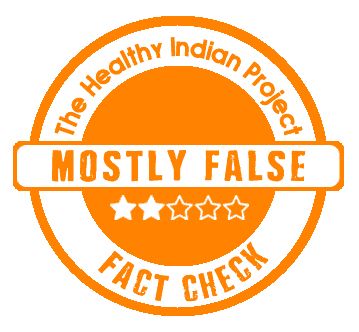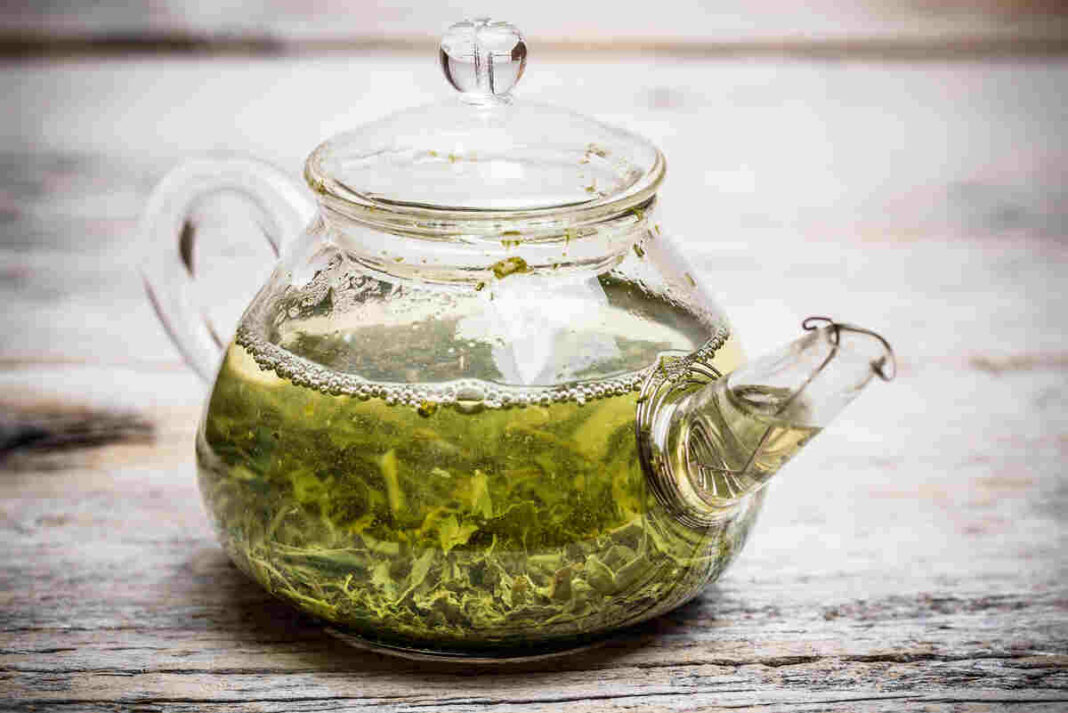Last Updated on February 19, 2024 by Aditi Gangal
Quick Take
A social media post claims that drinking green tea prevents depression. We fact-checked and found the claim to be Mostly False.

The Claim
A Pinterest post has listed the potential health benefits of drinking green tea. In one point, the post claims that drinking green tea prevents depression.
We have attached a screenshot of the post below:

In another fact-check story, we debunked the Gotu Kola plant cures depression. We also refuted morning walks cure depression.
Fact Check
What is green tea?
Green tea is popular worldwide and is consumed both hot and cold. It is made from the leaves of the Camellia sinensis plant. This plant also produces black tea, oolong tea, and white tea. However, what distinguishes green tea from other types of tea is the minimal oxidation process it undergoes during production.
Green tea is made through minimal oxidation process. This helps green tea retain its natural antioxidants and nutrients.
Are there health benefits of drinking green tea?
It may. Green tea may offer health benefits. This includes antioxidant protection, improved heart health and weight management support. Green tea may also enhance brain function, reduce cancer risk, improve dental health, and lower risk of diabetes. However, moderation is key due to its caffeine content, and individual responses may vary.
What does the evidence say about the impact of green tea on brain health?
Green tea has gained attention for its potential benefits to brain health due to its rich content of bioactive compounds, particularly catechins, and caffeine. We have collated a few research papers that talk about the impact of green tea on brain health.
Antioxidant properties: Green tea is rich in antioxidants, particularly catechins such as epigallocatechin gallate (EGCG). These antioxidants may help protect brain cells from oxidative stress, which is associated with aging and neurodegenerative diseases like Alzheimer’s and Parkinson’s.
Neuroprotection: Green tea catechins may have neuroprotective effects, potentially reducing the risk of neurodegenerative diseases and improving cognitive function. However, we need more research to confirm these effects in humans.
Improved cognitive function: Regular consumption of green tea may be associated with improved cognition and a reduced risk of cognitive decline. However, results have been mixed, and more robust clinical trials are needed to establish a causal relationship.
Enhanced mood and mental alertness: The caffeine content in green tea can promote alertness and improve mood, which may indirectly benefit brain health by enhancing cognitive performance and reducing the risk of depression.
Potential role in neurogenesis: Green tea catechins may promote neurogenesis. This process makes new neurons in the brain. This could have implications for cognitive function and mental health.
Overall, while there is some evidence to suggest that green tea may have positive effects on brain health. However, we need more high-quality research, including randomized controlled trials in human populations, to fully understand the mechanisms and benefits of green tea consumption for the brain. Additionally, individual responses to green tea may vary based on factors such as genetics, overall diet, and lifestyle habits.
Can drinking green tea prevent depression?
Not exactly. There is not enough evidence that drinking green tea prevents depression. Available scant evidence only suggests that drinking green tea can improve depressive mood. Another research paper published in 2023 informs that long-term green tea consumption can reduce the risk of depression in postmenopausal women.
Our research shows that green tea contains compounds such as L-theanine, an amino acid known for its calming effects, and antioxidants like catechins, which may have neuroprotective properties. These compounds could potentially have a positive impact on mental health, including potentially reducing stress and anxiety.
However, it is important to note that while there is some evidence suggesting a link between green tea consumption and mental well-being, the evidence is not definitive. Studies exploring the relationship between green tea and depression are still ongoing, and we need more research to fully understand the potential benefits and mechanisms involved.
In any case, drinking green tea as part of a balanced and healthy lifestyle may have various health benefits, but it should not be seen as a standalone treatment for depression. It is essential to seek professional help from a healthcare provider who can provide appropriate diagnosis and treatment options.

Dr Rahul Bansal, Consultant psychiatrist in an interview with THIP adds, “Any delay in treatment will worsen the health”.
The idea that drinking green tea alone can prevent depression is an oversimplification of a complex condition, and it is essential to approach depression treatment with a comprehensive and individualized approach.

Psychiatrist Dr Binda Singh states, “Depression is a disease and needs proper treatment. It can happen due to a variety of reasons, such as situational, trauma, physical health issues, etc. Depression needs intervention, which might include medication, counselling, positive thoughts, communication, etc. Unfortunately, the dietary cure for depression has no scientific evidence”.

Experienced psychiatrist Dr Sameer Kalani in an interview with THIP MEDIA informs that home remedies alone cannot treat the root cause of depression.
Disclaimer: Medical Science is an ever evolving field. We strive to keep this page updated. In case you notice any discrepancy in the content, please inform us at [email protected]. You can futher read our Correction Policy here. Never disregard professional medical advice or delay seeking medical treatment because of something you have read on or accessed through this website or it's social media channels. Read our Full Disclaimer Here for further information.

